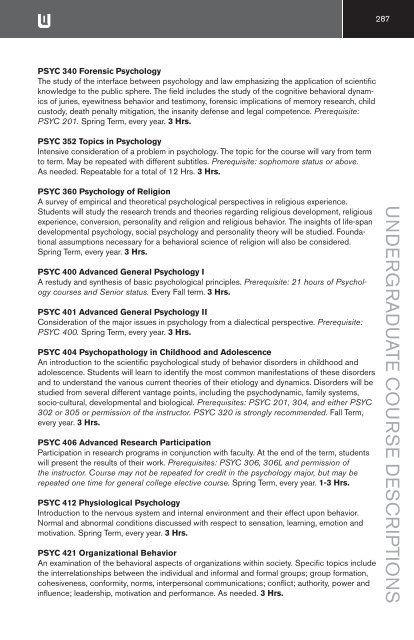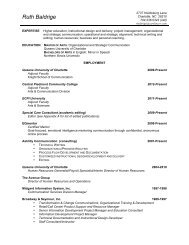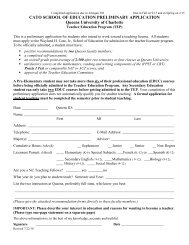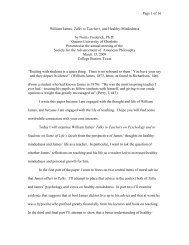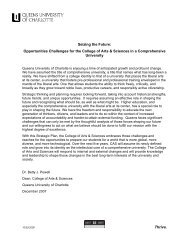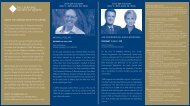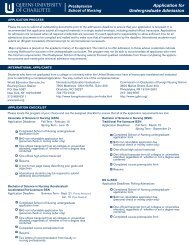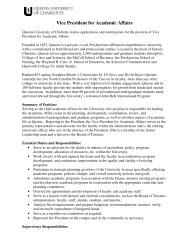2008-2009 Academic Catalog - Queens University of Charlotte
2008-2009 Academic Catalog - Queens University of Charlotte
2008-2009 Academic Catalog - Queens University of Charlotte
You also want an ePaper? Increase the reach of your titles
YUMPU automatically turns print PDFs into web optimized ePapers that Google loves.
287<br />
PSYC 340 Forensic Psychology<br />
The study <strong>of</strong> the interface between psychology and law emphasizing the application <strong>of</strong> scientific<br />
knowledge to the public sphere. The field includes the study <strong>of</strong> the cognitive behavioral dynamics<br />
<strong>of</strong> juries, eyewitness behavior and testimony, forensic implications <strong>of</strong> memory research, child<br />
custody, death penalty mitigation, the insanity defense and legal competence. Prerequisite:<br />
PSYC 201. Spring Term, every year. 3 Hrs.<br />
PSYC 352 Topics in Psychology<br />
Intensive consideration <strong>of</strong> a problem in psychology. The topic for the course will vary from term<br />
to term. May be repeated with different subtitles. Prerequisite: sophomore status or above.<br />
As needed. Repeatable for a total <strong>of</strong> 12 Hrs. 3 Hrs.<br />
PSYC 360 Psychology <strong>of</strong> Religion<br />
A survey <strong>of</strong> empirical and theoretical psychological perspectives in religious experience.<br />
Students will study the research trends and theories regarding religious development, religious<br />
experience, conversion, personality and religion and religious behavior. The insights <strong>of</strong> life-span<br />
developmental psychology, social psychology and personality theory will be studied. Foundational<br />
assumptions necessary for a behavioral science <strong>of</strong> religion will also be considered.<br />
Spring Term, every year. 3 Hrs.<br />
PSYC 400 Advanced General Psychology I<br />
A restudy and synthesis <strong>of</strong> basic psychological principles. Prerequisite: 21 hours <strong>of</strong> Psychology<br />
courses and Senior status. Every Fall term. 3 Hrs.<br />
PSYC 401 Advanced General Psychology II<br />
Consideration <strong>of</strong> the major issues in psychology from a dialectical perspective. Prerequisite:<br />
PSYC 400. Spring Term, every year. 3 Hrs.<br />
PSYC 404 Psychopathology in Childhood and Adolescence<br />
An introduction to the scientific psychological study <strong>of</strong> behavior disorders in childhood and<br />
adolescence. Students will learn to identify the most common manifestations <strong>of</strong> these disorders<br />
and to understand the various current theories <strong>of</strong> their etiology and dynamics. Disorders will be<br />
studied from several different vantage points, including the psychodynamic, family systems,<br />
socio-cultural, developmental and biological. Prerequisites: PSYC 201, 304, and either PSYC<br />
302 or 305 or permission <strong>of</strong> the instructor. PSYC 320 is strongly recommended. Fall Term,<br />
every year. 3 Hrs.<br />
PSYC 406 Advanced Research Participation<br />
Participation in research programs in conjunction with faculty. At the end <strong>of</strong> the term, students<br />
will present the results <strong>of</strong> their work. Prerequisites: PSYC 306, 306L and permission <strong>of</strong><br />
the instructor. Course may not be repeated for credit in the psychology major, but may be<br />
repeated one time for general college elective course. Spring Term, every year. 1-3 Hrs.<br />
PSYC 412 Physiological Psychology<br />
Introduction to the nervous system and internal environment and their effect upon behavior.<br />
Normal and abnormal conditions discussed with respect to sensation, learning, emotion and<br />
motivation. Spring Term, every year. 3 Hrs.<br />
PSYC 421 Organizational Behavior<br />
An examination <strong>of</strong> the behavioral aspects <strong>of</strong> organizations within society. Specific topics include<br />
the interrelationships between the individual and informal and formal groups; group formation,<br />
cohesiveness, conformity, norms, interpersonal communications; conflict; authority, power and<br />
influence; leadership, motivation and performance. As needed. 3 Hrs.<br />
UNDERGRADUATE COURSE DESCRIPTIONS


